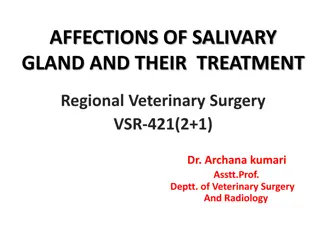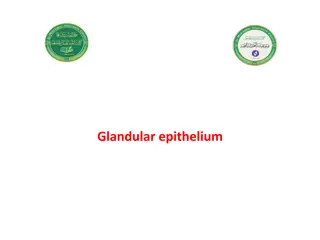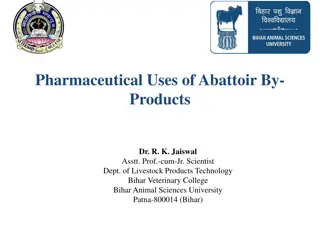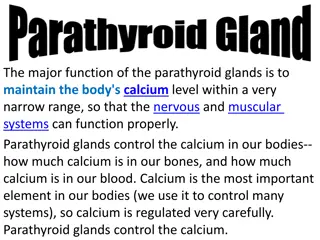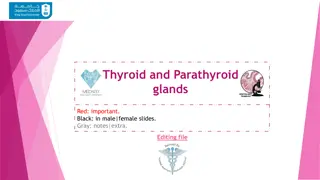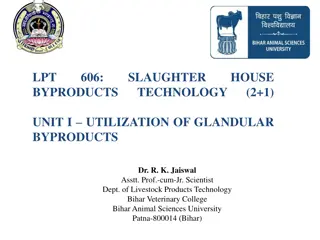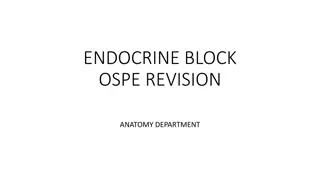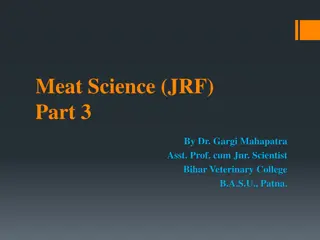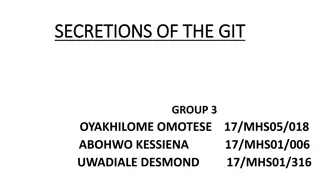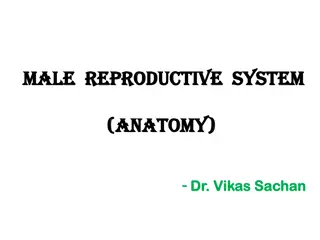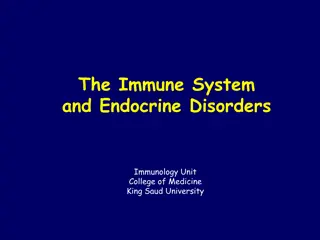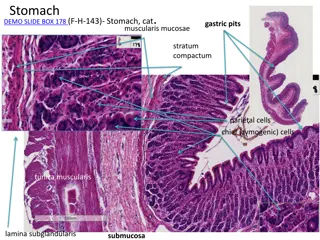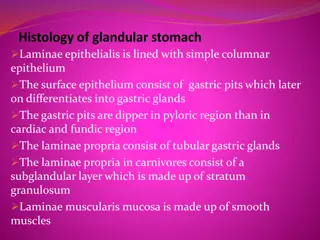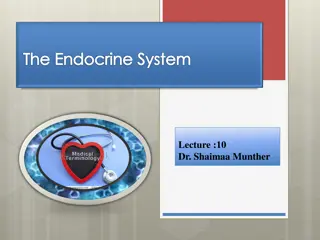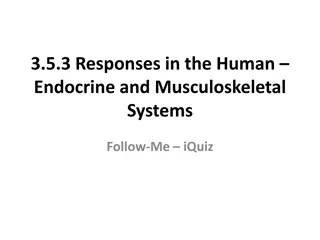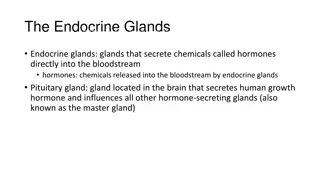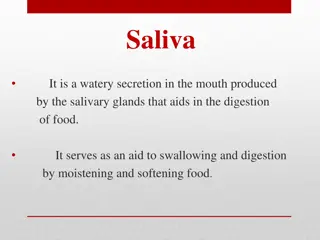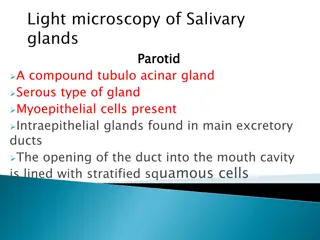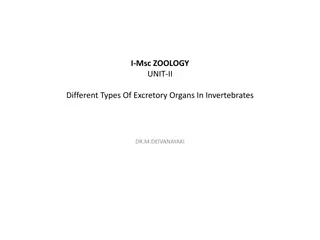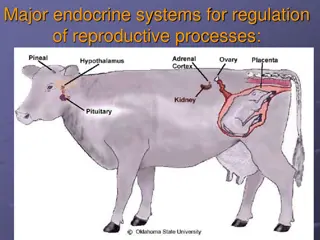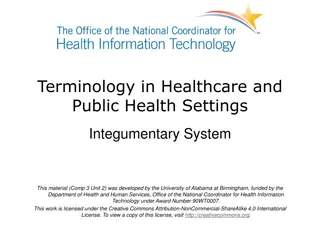SALIVARY GLAND IMAGING
Salivary gland imaging plays a crucial role in diagnosing and monitoring diseases of the major salivary glands, including the parotid, submandibular, and sublingual glands. Different imaging techniques such as computed tomography, MRI, and ultrasound are used to visualize these glands and aid in dif
1 views • 12 slides
Comprehensive Overview of Pancreas Function and Structure
Pancreas is a vital organ in the abdomen with dual exocrine and endocrine functions. As an exocrine organ, it secretes digestive enzymes and bicarbonates into the duodenum for food breakdown. In its endocrine role, the pancreas regulates blood sugar levels by secreting insulin, glucagon, somatostati
1 views • 16 slides
Affections of Salivary Glands in Veterinary Surgery: Overview and Treatment
Salivary gland affections in animals, particularly dogs, are discussed, highlighting the main pairs of salivary glands and their locations. The content covers details on the parotid, mandibular, sublingual, and zygomatic glands, along with their respective ducts. Information on congenital and acquir
0 views • 28 slides
Understanding Glandular Specialized Epithelium and Glands
Glandular specialized epithelium forms a class of epithelial tissues with specific functions and structures, composed of cuboidal, columnar, and ciliated columnar epithelial cells. These tissues contain gland cells that are secretary in nature, with zymogen granules in the cytoplasm. Glands are spec
1 views • 35 slides
Understanding Glandular Epithelium and Secretory Cells
Glandular epithelium consists of epithelial cells specialized in producing and secreting various macromolecules, found in glands throughout the body. These secretory cells can synthesize proteins, lipids, and carbohydrates, with different types of glands such as exocrine and endocrine glands. The se
0 views • 13 slides
Pharmaceutical Uses of Abattoir By-Products in Medicine
Animal glands play a significant role in medicine due to their healing properties. Glands contain digestive enzymes and hormones that are extracted for pharmaceutical purposes. The utilization of glands in India has been neglected but holds economic potential in major cities. Proper collection and p
1 views • 22 slides
Understanding Diseases of the Hair, Wool, Follicles, and Skin Glands
Diseases of the Hair, Wool, Follicles, and Skin Glands covers various conditions like alopecia, hypotrichosis, and the failure of follicles to develop or produce fibers. It discusses causes, pathogenesis, clinical findings, and treatments related to hair and skin issues. The content delves into cong
0 views • 18 slides
Hormonal Control in Animals: GCSE Biology Lesson
Explore the fascinating world of hormonal control in animals through this GCSE Biology lesson. Learn about hormones, the endocrine system, glands, and their roles in maintaining homeostasis. Understand the advantages and disadvantages of hormonal coordination, and study specific hormones and their f
0 views • 29 slides
Understanding the Secretory Functions of the Alimentary Tract
This content delves into the secretory functions of the alimentary tract, focusing on the secretion of saliva and the role of mastication. It covers the anatomy of salivary glands, composition of saliva, control of secretion by the nervous system, and the functions of saliva in lubrication, protecti
1 views • 30 slides
Understanding Parathyroid Glands and Calcium Regulation
Parathyroid glands play a crucial role in maintaining the body's calcium levels within a narrow range to support the proper functioning of the nervous and muscular systems. Parathyroid hormone (PTH) regulates calcium concentration in the blood, impacting bone health and other physiological functions
4 views • 18 slides
Overview of Human Endocrine System in Life Sciences Presentation
This content provides a detailed examination guideline for understanding the human endocrine system in the field of life sciences. It covers essential topics such as the difference between endocrine and exocrine glands, hormone functions, gland locations with functions, and key terminology related t
1 views • 17 slides
Thyroid and Parathyroid Glands Histological Structure Overview
This detailed histological study covers the structure and function of the thyroid and parathyroid glands. It includes information on the stroma, parenchyma, follicular cells, parafollicular cells, and the microscopic structure of the parathyroid gland. The article also delves into the functions of v
0 views • 8 slides
Utilization of Glandular By-Products in Slaughter Technology
Animal glands, rich in healing substances, are valuable by-products in the pharmaceutical industry. This article emphasizes the overlooked potential for utilizing glands in India, focusing on collection and preservation methods to maintain the efficacy of hormones and enzymes extracted for medicinal
0 views • 22 slides
Endocrine Block OSPE Revision - Anatomy Department Presentation Slides
Explore this set of presentation slides prepared by the Anatomy Department for Endocrine Block OSPE Revision. The slides cover essential topics related to endocrine anatomical structures and functions, providing a comprehensive resource for revision and review.
0 views • 11 slides
Understanding Glands: Endocrine and Exocrine Systems
Glands play a crucial role in the body by producing and releasing substances for specific functions. Endocrine glands release hormones directly into the bloodstream, while exocrine glands secrete substances through ducts onto bodily surfaces. Different types of exocrine glands, such as sweat glands,
3 views • 22 slides
Understanding Endocrine Emergencies and Diabetes Mellitus
The endocrine system plays a crucial role in regulating various bodily functions through hormone release. This presentation by Mrs. Bincy Cherian delves into endocrine emergencies, specifically focusing on Diabetes Mellitus. It explains the differences between Type I and Type II diabetes, their clin
3 views • 28 slides
AHNS Endocrine Surgery Section Guidelines: Perioperative Pain Management and Opioid Reduction
The American Head and Neck Society Endocrine Surgery Section provides consensus statements on perioperative pain management and opioid reduction in head and neck endocrine surgery. Addressing the opioid addiction crisis, the expert panel offers guidelines on pain management strategies, opioid prescr
0 views • 18 slides
Utilization of Glands and Biochemicals in Meat Science Research
Glands play a crucial role in meat science research, with various organs such as pancreas, adrenal glands, and parathyroid gland providing valuable biochemicals like insulin, thyroxine, and corticosteroids. The extraction methods and applications of these glands in food science and medicine are deta
0 views • 25 slides
Exploring the Endocrine System as the Third Temple of our Body
Delve into the fascinating connections between the endocrine system and biblical references, likening its functions to the operations of the Tribe of Asher. Discover how this system, composed of glands producing hormones, impacts growth, metabolism, and sexual development. Explore the intricate netw
0 views • 24 slides
Understanding the Secretions of the Gastrointestinal Tract (GIT)
The gastrointestinal tract (GIT) is responsible for digestion, absorption, and secretion through various glands along the alimentary canal. Secretions are stimulated by factors like direct contact, nervous system activation, and hormonal regulation. Hormones released in response to food presence hel
0 views • 7 slides
Understanding the Male Reproductive System: An Overview by Dr. Vikas Sachan
Exploring the male reproductive system anatomy, including the testes, scrotum, reproductive ducts, and accessory sex glands, highlighting the production of sperm and male sex hormones. The role of primary and secondary sex organs, such as the epididymis, vas deferens, urethra, and penis, along with
0 views • 52 slides
Understanding the Interplay of the Immune System and Endocrine Disorders
Explore the intricate mechanisms of immunological damage to endocrine glands, focusing on disorders like Graves disease, Hashimoto's thyroiditis, type I diabetes, and Addison's disease. Delve into the association of autoantibodies with pathogenic and diagnostic significance, uncovering the complexit
0 views • 33 slides
Various Stomach Anatomy Slides of Different Animal Species
Explore a series of detailed histological slides showcasing the stomach anatomy of different animal species including cats, rabbits, dogs, pigs, sheep, and goats. The images highlight key features such as gastric pits, mucosal layers, chief and parietal cells, proper gastric glands, cardiac and pylo
0 views • 29 slides
Endocrine Potpourri: Adrenal Insufficiency and Incidentalomas - Case-Based Review
This endocrine potpourri covers various cases involving adrenal insufficiency, adrenal crisis, adrenal incidentalomas, and patient education. It includes a detailed case presentation, treatment guidelines for adrenal crisis, patient education on adrenal insufficiency, and evaluation of adrenal nodul
0 views • 62 slides
Understanding Male Reproductive Anatomy and Function
Explore the intricate male reproductive system from meiosis to accessory glands, learning about the purpose and location of processes like meiosis, sperm production in the testes, and the functions of structures such as the epididymis, vas deferens, urethra, and accessory glands in semen production
2 views • 23 slides
Structure of Gastric Mucosa in Glandular Stomach
The glandular stomach features laminae epithelialis lined with simple columnar epithelium, leading to differentiation into gastric pits and glands. The laminae propria houses tubular gastric glands, while the laminae muscularis mucosa is composed of smooth muscles. Different regions exhibit distinct
0 views • 14 slides
Understanding Blepharitis: Anatomy, Structure, and Glands of Eyelids
Blepharitis is a common eye condition characterized by inflammation of the eyelids. This article dives into the anatomy of eyelids, including their structure and the various glands present. It explains the position of eyelids, the canthi, and the palpebral aperture. Additionally, it discusses the Me
0 views • 31 slides
Understanding the Endocrine System: Key Concepts and Functions
The endocrine system, consisting of glands that release hormones into the bloodstream, plays a crucial role in regulating various body processes like metabolism, growth, reproduction, and stress response. Key glands include the pituitary, thyroid, pancreas, adrenal, ovaries, and testes, each produci
0 views • 34 slides
Understanding Responses in Human Endocrine and Musculoskeletal Systems
This interactive quiz explores key concepts related to the human endocrine and musculoskeletal systems, including exocrine glands, bone structures, hormone functions, and more. Test your knowledge on these vital systems and their responses through engaging questions and answers.
0 views • 50 slides
Understanding How Hormones Interact: The Endocrine System
The endocrine system comprises glands that release hormones into the bloodstream, influencing various bodily functions. Key glands include the pituitary, pineal, thyroid, pancreas, gonads, and adrenal glands, each playing a crucial role in regulating metabolism, growth, stress response, and reproduc
0 views • 5 slides
Understanding the Endocrine System: Hormones, Glands, and Regulation
The endocrine system, comprising glands such as the pituitary, thyroid, pancreas, and more, produces hormones that regulate various bodily functions. These hormones target specific cells with receptors, influencing metabolism, growth, energy usage, and more. By understanding how hormones interact wi
0 views • 12 slides
Understanding Saliva and Salivary Glands in Digestion Process
Saliva is a watery secretion produced by salivary glands in the mouth, aiding in food digestion, swallowing, and moistening food. Human salivary glands include parotid, submaxillary, and sublingual glands, each producing different types of secretions. The glands are made up of secretory acini and du
0 views • 29 slides
Understanding the Endocrine System: Glands and Hormones in Detail
Explore the intricate details of the endocrine system, focusing on key glands like the thyroid, parathyroid, adrenal, pancreas, and thymus, their functions, hormone secretion, and role in maintaining physiological balance through hormonal regulation mechanisms.
0 views • 13 slides
Overview of Salivary Glands Structure
Salivary glands play a crucial role in the production and secretion of saliva, aiding in digestion and oral health. The parotid gland is a compound tubuloacinar gland with serous characteristics, while the sublingual gland is a seromucous type. Minor salivary glands, found in carnivores, vary in com
0 views • 16 slides
Overview of Different Excretory Organs in Invertebrates
In invertebrates, there are various types of excretory organs such as the contractile vacuole, nephridium, renal gland, coxal gland, and Malpighian tubule. These organs play crucial roles in osmotic regulation and nitrogen excretion. Different phyla exhibit diverse excretory structures like nephridi
0 views • 6 slides
Understanding the Endocrine System: Functions and Glands Explained
Explore the intricacies of the endocrine system with a focus on its functions such as metabolism, growth, emotions, and more. Learn about key endocrine glands like the hypothalamus and pituitary, their roles in hormone regulation, and their impact on various bodily processes. Discover the significan
0 views • 17 slides
Overview of the Human Endocrine System
This presentation covers the terminology, differences between exocrine and endocrine glands, the location and functions of various glands in the endocrine system, and general information on how hormones coordinate the body's organs to maintain homeostasis.
0 views • 17 slides
Endocrine Systems in Reproductive Regulation
The endocrine system plays a crucial role in regulating reproductive processes by secreting hormones that influence cellular activity. This system involves ductless glands like the hypothalamus, pituitary gland, and other endocrine glands working together in a feedback mechanism. Hormones of various
0 views • 19 slides
Understanding the Integumentary System in Healthcare
Explore the integumentary system, which includes the skin, hair, nails, sebaceous glands, and sweat glands. Learn about its structure, functions, accessory organs, burns, skin cancer, and more. Enhance your knowledge of medical terms and common conditions related to the integumentary system.
0 views • 18 slides
Exploring the Intricacies of Mitosis, Neurons, and Endocrine System
Delve into the world of biology and neuroscience with detailed images depicting mitosis, chromatids, equator, spindle fibres, diploid and haploid cells. Explore the journey from stem cells to tissues and organs, including the Central Nervous System (CNS) components like cerebellum, cerebrum, and med
0 views • 72 slides


